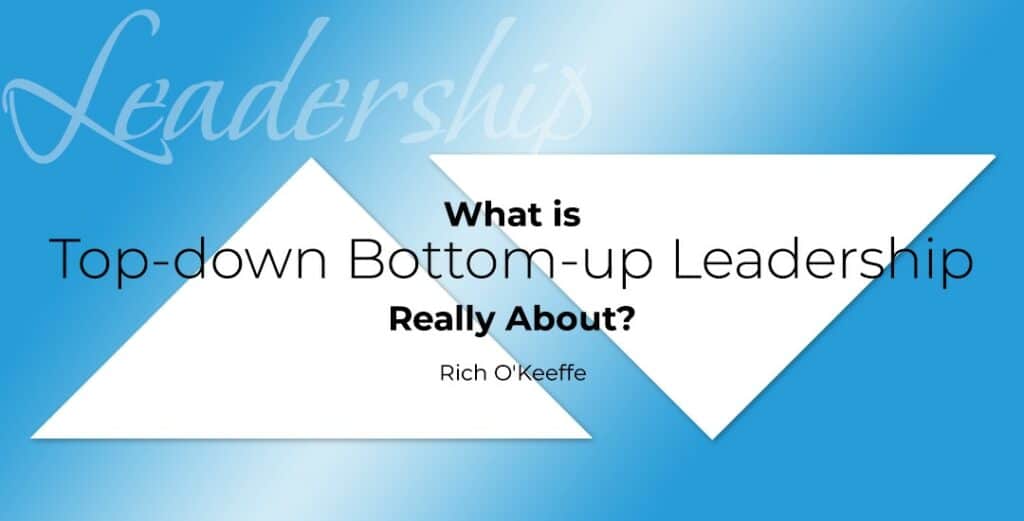Rich O’Keeffe
MDI Contributor
This started as an inquiry. I was asked to write about the difference between top-down leadership and bottom-up leadership.
And while this particular topic is one that a lot of folks write about, and a lot of business leadership consultants get paid a lot of money to address, I am of the opinion that the topic is a red herring sort of issue. I mean, sure, these are valid topics, but so is saying that when two people fail to get along, it is a “communication issue.” Saying that the matter is one of too much top-down, or too much bottom-up doesn’t say anything of substance about the real issues.
Top-down vs. bottom-up (call it TdBu) is at the root of business management practices – such as Holacracy, or Sociocracy, or Lean, or Six Sigma or any one of a suite of business leadership and management techniques and structures – designed to have the leaders and the people being led in a more collaborative manner than a traditional command and control type structure. There are literally thousands of business books, hell entire higher education degree programs, on the dance between centralization and de-centralization.
What I see is that many men use the top-down/bottom-up moniker as some sort of moral-ish high ground for why the “leadership” can’t be trusted, or the leadership is not serving, or why they have to stand in the way of where the leaders say they want to go.
Another side aspect to TdBu is that it often sets an expectation in some men’s minds that any and every decision made by a leader is somehow subject to review and approval of any individual man. While a lot of that is built into the fabric of Mentor Discover Inspire, I find some of the conversation by men as a means to take out their trust issues on their leadership. When I join a gym, and I pay a fee, I don’t get to tell the gym how they should spend my dues. I don’t get to tell the gym how much they should pay their staff, or what equipment they need to have. I do get to tell them what I want in their equipment, I guess – but it is always more in a survey or as a request and not a demand.
For the most part, the two biggest areas that are breeding grounds for distrust are money and sex. By and large, we have not had to ever deal with sex issues – though we have had men married to other men on the same men’s team, and a few issues related to how to comport ourselves around children. But money? Hoo boy.
I am not sure that that the TdBu inquiry is going to be all that powerful to address any schisms that occur in many of our circles between the leaders and the men. What I see is that there is a gap in trust. And for the most part, few people are truly skilled at engendering trust from others.
I saw something recently (wish I could find the source for attribution) that spoke to how to argue. The speaker posited that most people argue in order to win. To prove themselves correct. But the better method to argue is so that you both can come to consensus. Even if in the end, you agree to disagree. One thing that arguing to win creates is a winner and a loser. Or two sides who both think the other one is an asshole. By arguing to find consensus, among other things, one gives access to connecting with the other person in a meaningful way. Arguing to win deprives one of that connection, and all of the wonderful amazing juicy delicious love that ensues.
How does this apply to leaders and our circles, you ask?
I will give one example of how one can engender trust from either side of the story. Let’s say you have an idea for your next division meeting. And you bring it to the captain. And the Division Coordinator hears about it and he is unenthused, or even actively opposed. A situation that has caused more than a few men to more or less decide that MDI is not for them.
From either perspective, the situation usually ends up with arguing about the idea, ie “I had a great idea and you killed it” – or – “You brought me a bad idea.” And lines get drawn in the sand of our minds because we have taken a right/wrong tack to the inquiry. What if, in addition to bringing the idea, you had done the work to show how the idea fulfills on the vision of the leader? Or as the leader, what if instead of just saying no, you had instead replied with something along the lines of “”I don’t see how this fits who we are and what we are up to.” Time and time again, a small shift in the discourse – and in how we treat each other and from where we decide things – would result in an enormous shift in the amount of trust we create between us.
One additional point, as much as we all desire to feel like we get absolute say over our teams or our divisions, there need to be some guardrails in place.
MDI International has some dictates and legal obligations that are just handled in the background – like the accounting functions of all monies collected and reported to the IRS, for example. Many framework “rules” are in place so as to prevent “bad” situations from happening – like a finance manager taking his division’s treasury to the horse track and gambling the money away. Or a man taking young men who were coming to an MDI event off and accosting them. Or a division having events that are inconsistent with who it is that we are and what we stand for. Or a team or division having an event that is physically dangerous enough that someone getting a major injury is easy to see. Or having an event so foolish that when someone gets majorly injured, the negligence of it all becomes a legal matter that ends up being the end of MDI.
I get it how some of the things that come down from leadership sometimes come across a bit heavy handed, and MDI leadership has danced on both sides of that razor thin line between transparency and keeping confidential things that public knowledge of would not forward us collectively.
And I ask you to ask yourself the question, the next time you are having some sort of heavy TdBu finger pointing session in your head, to instead look and ask “What is it about this situation, or decision, that I am not trusting?” And begin the inquiry from there.
I am not saying anything like “blindly trust” or the like. It may be prudent to not trust something that is happening. Or it may be that one or the leaders is behaving in a manner that is not trustworthy. Having a clear inquiry from that place will give you access to a lot more trust and connection in your experience.

